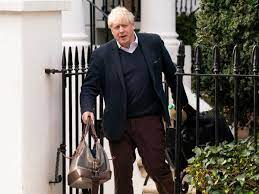Katy Balls
The four hours of evidence from Boris Johnson before the Commons privileges committee over Partygate held little in the way of surprises. With much of the witness testimony published in advance, there was no new smoking gun. Instead, there were plenty of tetchy exchanges as Johnson butted heads with the seven-strong committee of MPs. At times, it felt as though they were speaking past each other.
The reaction, too, was broadly as expected. The former prime minister’s detractors have been quick to seize on his comments as evidence of his reckless dishonesty and unsuitability for office. Meanwhile, Johnson’s most enthusiastic supporters offered a rather more optimistic interpretation – heralding the marathon session as a triumph for their man. Former cabinet minister Jacob Rees-Mogg declared: “Boris is doing very well against the marsupials.” Other core Johnson MP backers joined in – tweeting their confidence that the former leader would be “exonerated”. But there’s another reason Johnson’s appearance in the Grimond Room is unlikely to have changed many minds: a lot of Tory MPs didn’t even bother to tune in.
“I didn’t watch it,” said one member of the 2019 intake. “I don’t need to be reminded of that episode.” “God, no,” was another MP’s reaction on being asked whether they had tuned in. Speaking to MPs after the session, it’s a common refrain and testament to how Johnson’s power in the Tory party appears to be on the wane. Worn down by last year’s psychodrama, rather than look on the investigation with high-stakes excitement, most would just like to pretend it’s not happening. After a good few weeks for Rishi Sunak, Johnson’s appearance is seen by many in the party as a nuisance to get through rather than the beginning of a pathway to a comeback. In No 10, there was a conscious effort to insist it was business as usual – even if Sunak managed to find an upside to the Johnson circus by publishing his tax return midway through Johnson’s appearance. “Boris has become Rishi’s dead cat,” one MP jokes – in reference to the Lynton Crosby tactic of a shocking announcement diverting attention from the story you don’t want people to talk about.
But it’s more than that – some in government are keen to show that Sunak is not scared of his predecessor. It’s no coincidence that the vote on the Windsor framework was held on a day Johnson had to be in parliament – meaning Johnson could not conveniently be away and miss the vote. It forced the former prime minister to put his money where his mouth was and vote against the deal. “Sunak is facing down his critics,” says a government adviser. The fact that only 22 Tory MPs voted against the deal is seen as a success in Downing Street. While some members of the European Research Group point to the number of Tory abstentions – 48 – as evidence that there was wider unease over the renegotiated Northern Ireland protocol deal, at least some of that number were allowed to miss the vote. Ultimately, only a handful of MPs – including the former cabinet ministers Jake Berry and Priti Patel – were willing to join Johnson in the public rebel camp.
“It’s a mix of the people who really don’t like Rishi and then the Brexit ultras,” says one Tory MP. If the list of “MPs who really don’t like Rishi” is under 22 – well below the number that demolishes the Tories’ working majority – he is doing pretty well, given the amount of poison released over the past year by the infighting that led to two Tory PMs being removed. Yet while the mood may fall short of a Johnson comeback, the whole circus still presents problems for the government. It’s not just the prospect of weeks more of Partygate coverage as Sunak tries to look ahead. It’s what happens if the committee finds Johnson guilty and recommends a suspension of 10 or more sitting days. This would need to be voted on by the House of Commons in what Sunak has said would be a free vote. Even though Johnson’s parliamentary supporters and the pro-Boris Conservative Democratic Organisation would probably encourage – or pressure – MPs to vote against the punishment, it would probably pass. “Any byelection right now is bad,” says a government adviser. “But this would be particularly bad.”
At that point the real purpose of much of Johnson’s and his supporters’ positioning would come into effect. “The audience Boris and his supporters are trying to win is the court of Tory opinion – it’s about what happens after the committee verdict,” says one MP sympathetic to the former prime minister’s cause. “It’s not just Tory MPs, it’s members and voters.” Despite the state of the polls, there are some Tory MPs who believe Johnson could turn a byelection to his advantage. “He would win the byelection,” insists one MP, who backed Sunak in the last leadership contest. “Boris has big star power – and the party would be forced to pump money in.” As well as resources, the cabinet would be under pressure to put time into fighting it.
A byelection would allow Johnson a chance to whip up the grassroots and take centre stage once again. Given how low expectations are for the party’s prospects after multiple losses, a hold would be spun as a huge success. There’s already talk of running a campaign attacking Sadiq Khan’s ultra-low emission zone (Ulez). With the mood in the party increasingly turning cold on the idea of a Johnson comeback anytime soon, the best Sunak can hope for is for the whole affair to die down. The last thing the prime minister needs, for his party and premiership, is anything that extends the Johnson circus one day further.







